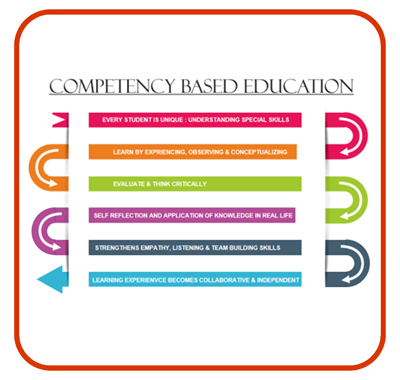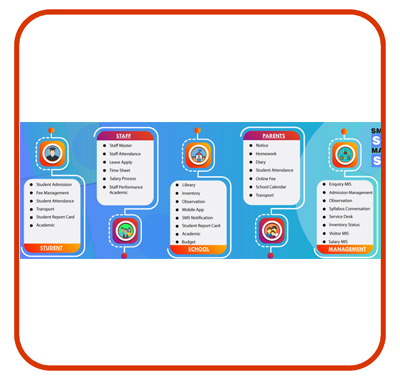Teaching Methodology
Pre-Primary Methodology
- In St.Andrews the objective of pre- primary is to facilitate learning by creating ,nurturing and stimulating environment for them to learn joyfully.
- Teaching pedagogy is child centric and activity oriented by using numerous teaching aids - Power point, flash cards, pictures, puppets, actual objects, story telling, dramatization and role play.
- Our teaching method is based on play way/montessori method with international curriculum for the global citizens of the future.
Children at this stage
- Identify self by specific abilities, characteristics and preferences (e.g., by gender, age, as part of a family, friends, colours, food etc.) develop a sense of balance and physical coordination through play.
- Learn language through activities like role play, storytelling, poetry recitation, singing and reading age appropriate and level based books.
- Understand to analyse their actions as right or wrong.
- Learn to be friends with children from diverse backgrounds, celebrate various festivals, sing and dance together.
- Learn to live in harmony with their environment, make observations, enquire and ask questions – what, how & why.
- Relate a numeral to its respective quantity, associate value to a number and identify shapes by names: Curved and straight lines, circle, square, triangle and understand spatial relationships.
- Learn to manage their feelings and emotions and learn appropriate behaviour.
- Demonstrate the ability to begin to assume responsibility for their own safety within their environment.
Primary Methodology
- Education is knowledge imbued with wisdom and ethics which moulds the behaviour and personality of the students. The Value -based Education approach at St. Andrews Scots Sr.Sec. School offers a new way of thinking about education and how children can be supported to develop to become successful and happy members of the global society. It builds the various qualities of honesty ,strength and humility in a person in regards to their social moral and spiritual behavior .
- In primary school the education program combines the curriculum assigned . It is designed to emphasize the need to enhance linguistic and logical ability skills .Simultaneously, it also adopts innovative and advanced methods to stimulate interest among the students and enable them to become tech savvy. Primary students learn through examining units that are delivered by both classroom teachers and subject specialists using different teaching aids both audio and visual.
- Languages (English, Hindi) – Acquire the skills of listening, speaking, reading & writing, acquire varied range of vocabulary, develop interpersonal communication skills and express meaningfully. Third Language is introduced in Class IV. These languages are taught through activities with an aim to initiate the language in a fun way. However, a more structured syllabus is followed in the upper primary stage. Students can opt for one of the languages out of Sanskrit & French
- Mathematics – Performing operation of numbers, understanding shapes, similarities and differences, collecting data, representing and analysing the data, identifying patterns in shapes and numbers etc.
- Environmental Science – To make them aware of their surroundings, appreciative of and sensitive of environmental issues (natural, physical, social and cultural)
- Information & Communication technology
- Visual Arts & Performing Arts
- Physical & Health Education
- Life skills & Value Education
The learning areas include -
Secondary Methodology
- St. Andrews envisions the all-round develoment of students in consonance with the holistic approach to education and therefore, emphasizes integration of co curricular domain with curricular domain in an equitable manner. Secondary Curriculum provides students a broad and balanced understanding of subjects including languages, Mathematics, Science and Social Science to enable students to communicate effectively, analyse information, take informed decisions, construct their worldview in alignment with constitutional values and move ahead in the direction of becoming productive citizens.
- The recent focus of the school is on the development of 21st century skills in settings where each student feels independent, safe and comfortable with their learning. The school is also trying to align curriculum in a way so that children feel more connected to it and employ their learning in real life contexts. To achieve this aim, it is extremely important that children acquire adequate knowledge and skills in other core areas like Health and Physical Education, Life Skills, Values Education, Art Education, Work Education and other Co-Scholastic areas.
- The recent focus of the school is on the development of 21st century skills in settings where each student feels independent, safe and comfortable with their learning. The school is also trying to align curriculum in a way so that children feel more connected to it and employ their learning in real life contexts. To achieve this aim, it is extremely important that children acquire adequate knowledge and skills in other core areas like Health and Physical Education, Life Skills, Values Education, Art Education, Work Education and other Co-Scholastic areas.
- In operational sense, the secondary curriculum is learner-centered with school being a place where students would be acquiring various skills; building self concept, sense of enterprise, aesthetic sensibilities and sportsmanship. Therefore, for the purpose of fostering core competencies in learners, this curriculum encompasses major learning areas, from scholastic and co scholastic point of view.
Senior Secondary Methodology
A futuristic, all-encompassing approach towards teaching is adopted for teaching the students in the senior secondary wing. Some common features for all the three streams include career counselling, personality development and soft skills workshops. Efforts are made to keep the students abreast of the latest development in technology , the world economy and changes in the socio-political scenario.
Some of the salient features of the pedagogy at this stage are -
- Interactive classroom teaching
- Lab Experiments and in-depth projects for practical approach to learning. The Physics , Chemistry, Biology and Computer Science labs are equipped with all latest technology.
- The projects made by the children for Accountancy, Business Studies , Economics, History, Political Science , Computer Science , Biology, Mathematics and English are based on contemporary requirements , in-depth knowledge .
- They are aimed at developing an analytical mindset. Integrating art in projects as per CBSE guidelines are an important aspect to enhance the creativity and innovative ideas in the students.
- The teachers have brain storming sessions to ensure the perennial perspective, practical innovation inductive and deductive approach and inclusiveness of changing perspectives in the teaching methodology.
- The aim is to develop critical thinking skills, debating and presenting their views in the most convincing and persuasive manner. The best practices in education for ensuring success , goal setting and diligence to achieve goals are some of the important common areas for all the three streams.
- Interactive classroom teaching










